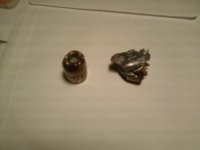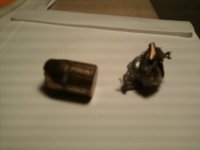I've tried to wrap my head around why every shooter (mostly reloaders that have the ability to produce what they want) is so fixated on velocity, velocity, and more velocity...
I don't own a chrono (yet, but I'll get one), just do my load development the way the books told me from day one. Start low, work up, and find the magic combination that keeps the holes closest together.
Maybe I'm an aberration- but I've found that the "best" load has never been the maximum load/velocity for any of the four rifles/four calibers I load for.
In fact, in our .308 and 7.62 x 54R, the most accurate loads are both towards the lower side of mid-range. "Hot" loads have never produced maximum accuracy for me.
Now, let me add that I understand the physics, and don't need anyone to explain the greater velocity means less flight time, less time for external influences to impact bullet flight, etc, etc... I get that. But, that doesn't explain to me why a load that produces more inconsistent groups would be preferred just because it flies to the target faster.
So why I am I different than everyone else? We shoot very accurately at long range, even if it means a few more clicks on the elevation turret...
I just have not seen this supposed correlation between pushing loads to the point where the primers flatten and maximum accuracy
I don't own a chrono (yet, but I'll get one), just do my load development the way the books told me from day one. Start low, work up, and find the magic combination that keeps the holes closest together.
Maybe I'm an aberration- but I've found that the "best" load has never been the maximum load/velocity for any of the four rifles/four calibers I load for.
In fact, in our .308 and 7.62 x 54R, the most accurate loads are both towards the lower side of mid-range. "Hot" loads have never produced maximum accuracy for me.
Now, let me add that I understand the physics, and don't need anyone to explain the greater velocity means less flight time, less time for external influences to impact bullet flight, etc, etc... I get that. But, that doesn't explain to me why a load that produces more inconsistent groups would be preferred just because it flies to the target faster.
So why I am I different than everyone else? We shoot very accurately at long range, even if it means a few more clicks on the elevation turret...
I just have not seen this supposed correlation between pushing loads to the point where the primers flatten and maximum accuracy


